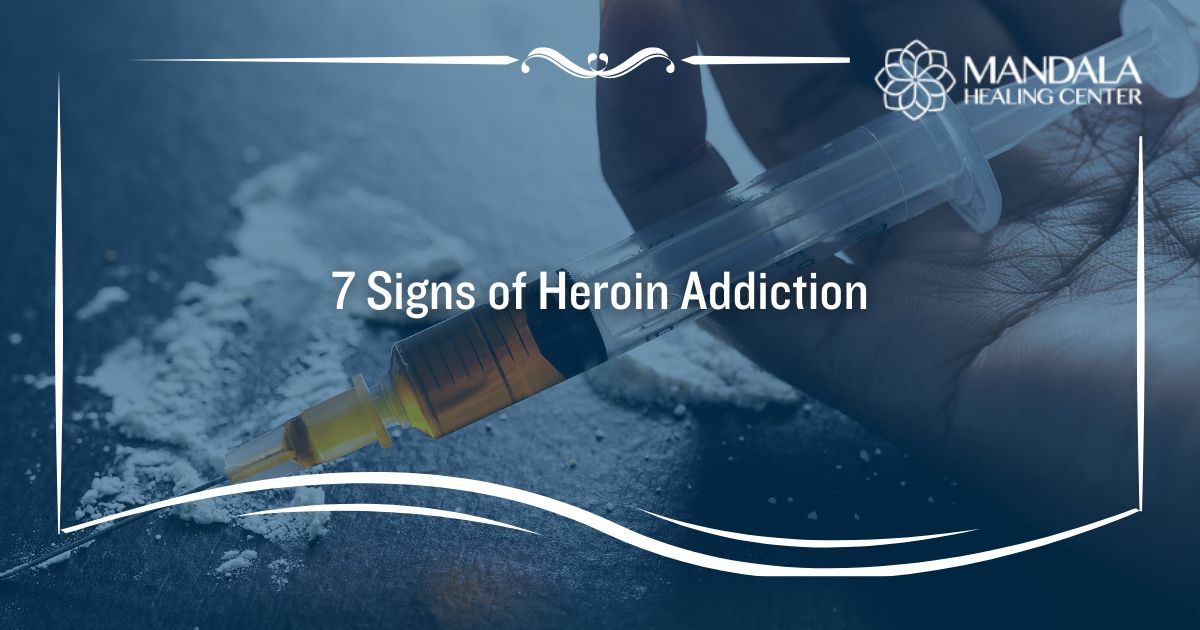Heroin is an illicit opioid drug that is highly addictive and incredibly dangerous to abuse. According to the National Institute of Drug Abuse, “among people aged 12 or older in 2021, 0.4% (or about 1.1 million people) reported using heroin in the past 12 months.”[1]
If you are worried that your loved one is abusing heroin, it’s important to be aware of the signs of heroin addiction. People who abuse heroin often use the drug intravenously, which means they inject it directly into their veins. This can lead to needle marks on the skin, used needles around their bedroom, and dangerous skin infections that can become life-threatening without treatment.
Being aware of the 7 signs of heroin addiction can allow you to find your loved one professional help before it’s too late.
1. Track Marks and Infections
While some people might smoke or snort heroin, it is more common for people to inject the drug. Even individuals who begin by smoking or snorting the drug eventually begin injecting it as they build a tolerance to the substance. If your loved one is injecting heroin, they will eventually develop track marks and skin infections.
Track marks are bruises or holes from needles that are left behind after someone injects heroin. Because the needles they use are not always sterile, your loved one can also develop infections at the injection sites.
2. Frequently Falling Asleep or “Nodding Off”
Heroin is a central nervous system depressant, which means it can cause severe drowsiness and tiredness. This might cause your loved one to randomly fall asleep when they are under the influence of heroin. If you notice your loved one nodding off when they have no reason to be exhausted, they could be abusing heroin.
3. Drug Paraphernalia
People who abuse heroin might leave drug paraphernalia lying around their personal spaces, such as their house, bedroom, or even their cars. Your loved one might also have a bag that they carry around with them that contains everything they need to inject heroin.
The drug paraphernalia associated with heroin includes:
- Needles or syringes
- Small baggies with powdery residue
- A tourniquet to tie off with, like a belt
- Burnt spoons
- Small straws used for snorting heroin
- Burnt squares of tin foil used to smoke heroin
- Cigarette filters or cotton that is used as a filter when cooking heroin
4. Unexplained Weight Loss
Because heroin is a central nervous system depressant, people who abuse this substance often forget to eat. This can cause them to lose a significant amount of weight in a short period.
Other reasons heroin causes weight loss include:
- A lack of money to buy food
- Prioritizing heroin abuse above eating
- Nausea caused by heroin prevents them from being hungry
5. Money Troubles
Because of the stereotypes associated with heroin users, people often believe that heroin is cheap. However, heroin can actually be quite expensive. As a result, your loved one might begin to have significant financial issues when they become addicted to heroin.
Unfortunately, people who are addicted to heroin will do whatever they have to in order to obtain the substance. Your loved one might skip paying their bills, stop buying food, or begin engaging in illegal activities to obtain the money they need to buy heroin.
6. Experiencing Withdrawal
When someone is addicted to heroin, their brain and body grow accustomed to the presence of it. Their bodies are relying on heroin to function properly. If your loved one does not use heroin before the substance leaves their system, they will experience symptoms of withdrawal.
The symptoms of heroin withdrawal include:[2]
- Flu-like symptoms
- Vomiting and diarrhea
- Chills and excessive sweating
- Runny nose
- Watery eyes
- Muscle and bone pain
- Restlessness or anxiety
- Severe agitation
- Abdominal cramps
- Uncontrollable urges to abuse heroin
If your loved one displays the above-mentioned symptoms, they are suffering from heroin addiction.
7. Social Isolation
Another common sign of heroin addiction is isolation from friends or loved ones. Because heroin causes obvious signs of intoxication, your loved one might begin to withdraw socially to prevent people from noticing they are high. Additionally, the depressant effects of heroin make it difficult for people to socialize, causing them to rather sit alone in their rooms.
Find Help for Heroin Abuse and Addiction
If you or a loved one are addicted to heroin, it’s time to seek professional help. Long-term heroin abuse can lead to an array of adverse effects, including frequent life-threatening overdoses. Because of this, you must seek professional help.
At Mandala Healing Center, we can provide you or your loved one with all of the tools and support you need to maintain long-term sobriety. To learn more about our heroin rehab program, please contact us today.
References:
- The National Institute of Drug Abuse (NIDA): What is the scope of heroin use in the United States, Retrieved July 2023 From https://nida.nih.gov/publications/research-reports/heroin/scope-heroin-use-in-united-states
- The National Library of Medicine (NLM): Opioid Withdrawal, Retrieved July 2023 From https://www.ncbi.nlm.nih.gov/books/NBK526012/












